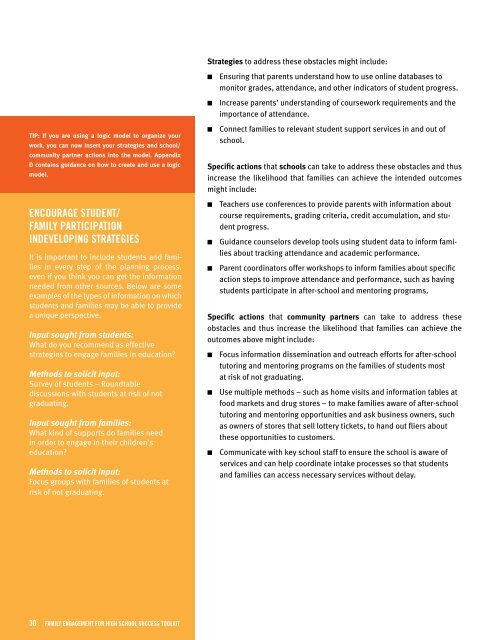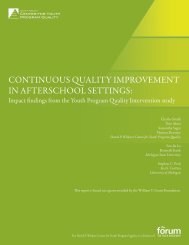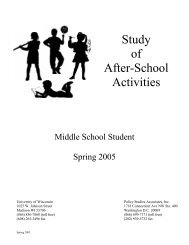View PDF
View PDF
View PDF
- No tags were found...
Create successful ePaper yourself
Turn your PDF publications into a flip-book with our unique Google optimized e-Paper software.
Strategies to address these obstacles might include:■■■■Ensuring that parents understand how to use online databases tomonitor grades, attendance, and other indicators of student progress.Increase parents’ understanding of coursework requirements and theimportance of attendance.TIP: If you are using a logic model to organize yourwork, you can now insert your strategies and school/community partner actions into the model. AppendixD contains guidance on how to create and use a logicmodel.Encourage student/family participationindeveloping strategiesIt is important to include students and familiesin every step of the planning process,even if you think you can get the informationneeded from other sources. Below are someexamples of the types of information on whichstudents and families may be able to providea unique perspective.Input sought from students:What do you recommend as effectivestrategies to engage families in education?Methods to solicit input:Survey of students – Roundtablediscussions with students at risk of notgraduating.Input sought from families:What kind of supports do families needin order to engage in their children’seducation?Methods to solicit input:Focus groups with families of students atrisk of not graduating.■■Connect families to relevant student support services in and out ofschool.Specific actions that schools can take to address these obstacles and thusincrease the likelihood that families can achieve the intended outcomesmight include:■■■■■■Teachers use conferences to provide parents with information aboutcourse requirements, grading criteria, credit accumulation, and studentprogress.Guidance counselors develop tools using student data to inform familiesabout tracking attendance and academic performance.Parent coordinators offer workshops to inform families about specificaction steps to improve attendance and performance, such as havingstudents participate in after-school and mentoring programs.Specific actions that community partners can take to address theseobstacles and thus increase the likelihood that families can achieve theoutcomes above might include:■■■■■■Focus information dissemination and outreach efforts for after-schooltutoring and mentoring programs on the families of students mostat risk of not graduating.Use multiple methods – such as home visits and information tables atfood markets and drug stores – to make families aware of after-schooltutoring and mentoring opportunities and ask business owners, suchas owners of stores that sell lottery tickets, to hand out fliers aboutthese opportunities to customers.Communicate with key school staff to ensure the school is aware ofservices and can help coordinate intake processes so that studentsand families can access necessary services without delay.30 Family Engagement for High School success Toolkit








